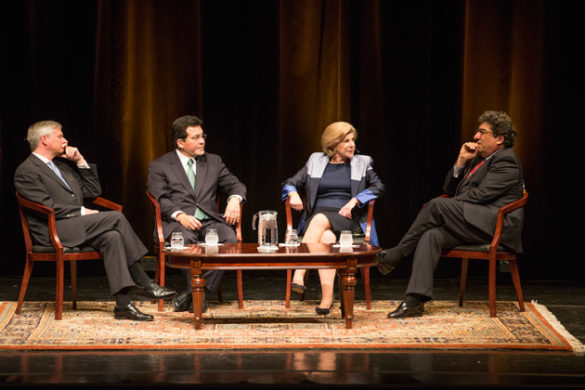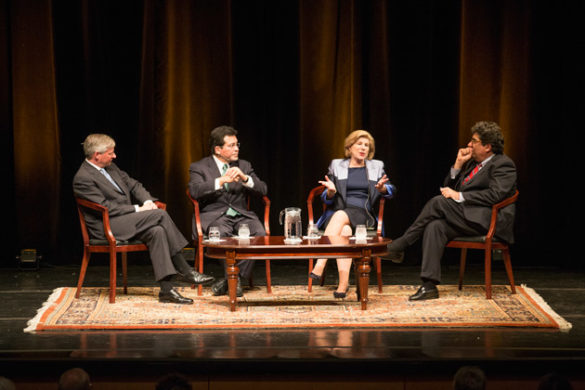
As if the political partisanship in Washington weren’t evident enough, the divisiveness has spilled over to filling vacancies on the U.S. Supreme Court. But the process wasn’t always so contentious, said the speakers at the latest Chancellor’s Lecture Series event.
Chancellor Nicholas S. Zeppos hosted “Battle Supreme: The Future of the Nation’s Highest Court”—featuring former U.S. Attorney General Alberto Gonzales, National Public Radio legal affairs correspondent Nina Totenberg and Vanderbilt Distinguished Visiting Professor Jon Meacham—March 30 in Langford Auditorium.
Gonzales said he finds the current effort by Senate Democrats to filibuster Judge Neil Gorsuch’s confirmation troubling—the same way it was troubling last year when Republicans refused to give then-Supreme Court nominee Merrick Garland a hearing.
“I am on the record as saying that (Garland) was mistreated,” Gonzales said. “I believe he was very well qualified. President Obama did his job in nominating a well-qualified individual, and the Senate should have done its job, quite frankly. If they were worried about Judge Garland going on the Supreme Court, they had the votes to block it.”
Totenberg agreed, saying that Garland had always been “the Republicans’ favorite Democrat.”
“Obama picks the person who I suspect was not his first choice, given his druthers, but who he thought was the person who would most likely get confirmed,” she said.
Despite this olive branch, Senate Majority Leader Mitch McConnell declared no action would be taken on any nominee during the 2016 election year. “I think the White House didn’t really believe it initially—they thought this was an untenable position,” Totenberg said. “But nothing’s untenable if you stick to it.”
Now Democrats find themselves—uncomfortably—in the same boat, but without the leverage of controlling the Senate.
“Which is why I can’t understand why they want to force the (filibuster) issue on Judge Gorsuch, who is obviously superbly qualified, obviously far more conservative than they would have liked, but also probably the best that the Democrats can hope for given the current circumstances,” she said.
How will the confirmation process for Gorsuch play out? Zeppos asked.

“I think the Democrats will have the votes to sustain a filibuster. I don’t know what would happen if McConnell said, ‘We’re going to have a second cloture vote,’ which is not unknown, but I don’t think he’s of that mind. I think he wants to just get this done,” Totenberg said. “I think Gorsuch will be confirmed, one way or the other—either they’ll find a way for the Democrats to walk away with a shred of dignity, or they’ll pull the trigger on the nuclear option. They’ll get rid of the filibuster for Supreme Court nominees, and the next thing that will happen is that they’ll get rid of it for legislation, too. Then the Senate will be much like the House—it will be more partisan, not less.”
When did the process of confirming Supreme Court justices become so combative, asked Meacham, noting that the late Antonin Scalia—a constitutional originalist and long considered the intellectual anchor of the court’s conservative wing—was confirmed 98-0. “Can you imagine that?” Meacham asked. “Justice Scalia was confirmed with no dissenting votes.”
Gonzales said that for Republicans, it likely started with the defeated nomination of Robert Bork in 1987. “But I think what’s happened here is that more and more people, as they look at Congress being ineffective, look at the court as where the real battleground occurs,” he said. “That’s why, I think, it’s become much more politicized and why the stakes are so much higher with respect to the Supreme Court.”
Another factor is that today’s Supreme Court justices are being nominated younger and serving longer. “Before 1970, the average tenure for a justice was 15 years. Today it’s 26 years. You’re talking about a big, big investment with a nomination and getting someone confirmed on the court,” Gonzales said.
There’s also been a shift—from character to ideology—in why justices are chosen, as well as a shift in what issues define the court. Totenberg said that in her parents’ lifetime, the dominant issue was school desegregation. When she first started as a reporter, it was issues surrounding the Vietnam War. Today’s issues are abortion and same-sex marriage.
“If you name people based on ideology—if the president picks people who he thinks agree with him on a lot of things as opposed to character and judicial experience and temperament—you are naturally going to get a more polarized court. And that’s what we have—it’s a reflection of our society,” Totenberg said.
“I’m assuming that Judge Gorsuch, should he be confirmed, will be very influential, both because of his skill and because people like him,” she said. “This is a court of nine people who spend most of their lives together. It’s like a dysfunctional marriage without the option of divorce.”